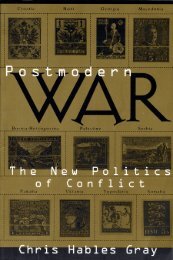Postmodern Wars Imaginary and Real: World War III - Chris Hables ...
Postmodern Wars Imaginary and Real: World War III - Chris Hables ...
Postmodern Wars Imaginary and Real: World War III - Chris Hables ...
You also want an ePaper? Increase the reach of your titles
YUMPU automatically turns print PDFs into web optimized ePapers that Google loves.
[ 154 ] The Past<br />
relations, not "serious . .. military possibilities." Another State Department<br />
official admitted that Reagan policy for winning a nuclear war was not a real<br />
policy but was only really established "for perceptual reasons." It was meant to<br />
impress allies as much as enemies (Kull, 1988, pp. 232-233).<br />
On the other h<strong>and</strong>, most of the officials share the assumption that there<br />
will always be war. A Pentagon official: "[Nations] want to fight. . . [because<br />
of] these genetic factors <strong>and</strong> Oedipal factors <strong>and</strong> everything else like that."<br />
A presidential adviser: "My whole theory of history is based on patterns... .<br />
The most important pattern about war can be stated in two words: it's<br />
recurrence." Both stress that despite war being irrational, it will still happen.<br />
"<strong><strong>War</strong>s</strong> are just going to go on," claimed one. "For people to act rationally goes<br />
against all history," summarized the other. A State Department official put<br />
it more starkly:<br />
Tensions begin to build up with you <strong>and</strong> [leaders] start making decisions<br />
to release the tension . . . [so] at a certain point everyone just decides,<br />
"Fuck, let's go to war!" It's just easier... I mean, you're not worried about,<br />
well, should we, shouldn't we do it. It's not a rational decision, (quoted in<br />
Kull, 1988, p. 239)<br />
A main driving force of this logic is technology itself. As Kull notes, "several<br />
respondents said, in nearly reverential tones, 'You can't stop technology!' " 2<br />
Kull explores in detail how every rationale was deployed to justify the<br />
nuclear arms race. A number of interview subjects admitted they couldn't<br />
justify their desire for more weapons when overkill was already surpassed ten<br />
times over. It was just a "visceral" need. Others, such as Colin Gray, justified<br />
more weapons because an arms race was less violent than actual war. Kull<br />
concluded that his subjects had a conception of humans as competitive <strong>and</strong><br />
warlike <strong>and</strong> they (the subjects <strong>and</strong> all humans) could not go against what<br />
they thought was their very "nature of being." He adds:<br />
At the deepest level it seemed that the most fundamental motive was<br />
almost mystical in nature: the desire to align oneself <strong>and</strong> fulfill not only<br />
one's own deepest nature but the deepest nature of being itself, (p. 247)<br />
Kull argues that these men managed to maintain emotional equilibrium<br />
by either suppressing thoughts <strong>and</strong> emotions or rationalizing them. A major<br />
factor in nuclear discourse is prenuclear "conventional principles," often<br />
evoking as emotion-laden symbols such historical events as Pearl Harbor, the<br />
appeasement of Hitler, or the Soviet s Great Patriotic <strong>War</strong>. All three of these<br />
historical tropes is an argument for a level of military preparedness that is<br />
probably inappropriate for a nuclear arms race. This emotional logic is very<br />
compelling. Almost all of Kull's respondents admitted under his questioning








